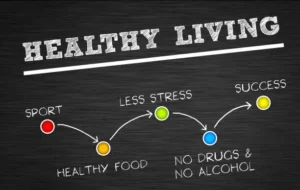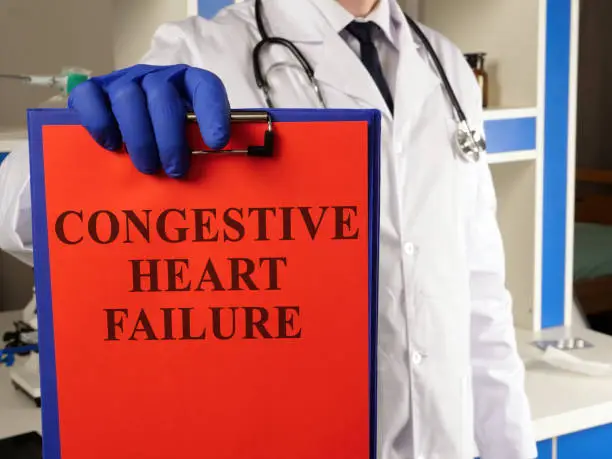Congestive Heart Failure (CHF) is a growing health concern affecting millions globally. It is a chronic, long-term condition that worsens over time. Despite its seriousness, CHF is often misunderstood. This blog provides a comprehensive and easy-to-understand overview of CHF, including its types, causes, signs, stages, treatments, and prevention methods.
Whether you are a patient, a caretaker, or just diagnosed, this comprehensive manual will assist you in getting to know CHF better and dealing with its risks.
What is Congestive Heart Failure (CHF)?
Congestive Heart Failure does not refer to the heart ceasing to function. Rather, it refers to your heart’s pumping capacity being impaired. The heart cannot provide sufficient blood rich in oxygen to satisfy the body’s demands, and fluid builds up — or “congestion” is present in the lungs, liver, abdomen, and legs.
Since CHF is a chronic illness, it progresses gradually. CHF is one of the leading causes of hospitalization and mortality throughout the world, particularly in older people.
Types of Congestive Heart Failure
CHF is primarily classified into three types, based on the way the pumping capacity of the heart is impaired:
1. Left-sided Heart Failure
This is the most typical form and happens when the left ventricle is not strong enough to pump blood out into the body. It can be further classified as:
- Systolic failure (HFrEF) – when the left ventricle is not able to contract strongly.
- Diastolic failure (HFpEF) occurs when the left ventricle becomes rigid and cannot fill.
2. Right-sided Heart Failure
This happens when the right side of the heart cannot effectively pump blood to the lungs. It usually results from left-sided failure, but can result from lung diseases such as chronic bronchitis or pulmonary hypertension.
3. Biventricular Heart Failure
Here, both sides of the heart are involved, and there are widespread symptoms in the body.
What Causes Congestive Heart Failure?
CHF usually occurs as a result of injury or stress on the heart. Some of the most common reasons are:
- Coronary Artery Disease (CAD)
A buildup of plaque in the arteries decreases blood supply to the heart muscle, which gets progressively weaker.
- High Blood Pressure (Hypertension)
Untreated high blood pressure overworks the heart, causing thickening or weakening of heart muscles.
- Heart Attack
The heart muscle may be damaged during a heart attack, making it more difficult for the heart to pump blood efficiently.
- Cardiomyopathy
An illness of the heart muscle frequently resulting from infections, alcohol misuse, drug overdose, or heredity.
- Valvular Heart Disease
Heart valves regulate blood flow direction. If the valves are obstructed or leaking, the heart must exert more effort to circulate blood, which fails.
- Congenital Heart Defects
Structural defects at birth may put additional stress on the heart and lead to heart failure years down the road.
- Arrhythmias
The heart may eventually become weaker due to abnormal heart rhythms.
- Diabetes
Higher levels of blood sugar can harm blood vessels and heart muscle, increasing the risk for CHF.
Symptoms and Signs of CHF
Symptoms of CHF may occur slowly (chronic) or suddenly (acute). Severity depends on stage and cause.
Some Common Symptoms Are:
- Shortness of breath with exertion or during rest
- Chronic fatigue and weakness
- Swelling in the legs, ankles, and stomach
- Rapid or irregular pulse
- Wheezing or coughing with pink-tinted phlegm
- Weight gain caused by fluid retention
- Decreased exercise tolerance
- Loss of appetite, nausea
- Increased frequency of night-time urination
- Confusion or loss of memory, particularly in elderly people
If the symptoms increase suddenly, it can be a sign of acute heart failure, which is a medical emergency.

Stages of Congestive Heart Failure
The American Heart Association (AHA) grades CHF into four stages (A to D) according to severity:
- Stage A – At Risk
No structural damage or symptoms yet, but at high risk due to diseases such as hypertension, diabetes, or family history.
- Stage B – Pre-Heart Failure
Although there is a structural change in the heart, no symptoms have yet appeared.
- Stage C – Symptomatic CHF
Breathlessness and exhaustion are obvious symptoms that begin to interfere with day-to-day functioning.
- Stage D – End-stage CHF
Severe symptoms continue even at rest. At this point, advanced interventions or a heart transplant may be necessary. Congestive Heart Failure (CHF)
Diagnosis: How CHF is Identified
To identify CHF, physicians generally utilize a series of physical exams, the history of the patient, and diagnostic tests.
Key Diagnostic Tools Include:
- Echocardiogram: Tests the ejection fraction (EF) to determine how efficiently the heart is functioning.
- Electrocardiogram (ECG): Identifies irregular heart rhythms or injury.
- Chest X-ray: Checks for lung fluid accumulation or an enlarged heart.
- Blood Tests: The levels of BNP or NT-proBNP are elevated in heart failure patients.
- Cardiac MRI or CT scan: Offers comprehensive visuals of the heart’s anatomy and how it functions.
- Stress Test: Evaluates heart performance during exercise.
Treatment Options for Congestive Heart Failure
Dependent on cause, severity, and overall health of the patient, CHF is managed. Even though CHF cannot be completely healed, early intervention significantly improves the outcome.
1. Medications
- ARBs and ACE Inhibitors: These drugs widen blood vessels to improve blood flow.
- Beta-blockers: Reduce heart rate and blood pressure.
- Diuretics (Water Pills): Assist in the removal of excess water.
- Aldosterone Antagonists: Decrease fluid holding and fibrosis.
- Digitalis: Increases the force of heart contractions.
- SGLT2 Inhibitors: Novel class of agents helpful for heart failure and diabetes.
2. Lifestyle Changes
- Low-sodium diet to avoid fluid retention
- Limit fluids if instructed
- Avoid smoking and alcohol
- Weight reduction if overweight
- Monitor a daily weight for abrupt change
- Regular physical activity, as tolerated
- Manage stress through relaxation, yoga, or therapy
3. Devices and Surgical Interventions
- Implantable Cardioverter Defibrillator (ICD): Helps prevent sudden cardiac arrest by correcting life-threatening heart rhythms.
- Cardiac Resynchronization Therapy (CRT): Enhances heart rhythm.
- Valve repair or replacement: If valve disease is present.
- Left Ventricular Assist Device (LVAD): Assists heart function in advanced cases.
- Heart transplant: Only when all other treatments fail. Congestive Heart Failure (CHF)
Preventing CHF: Healthy Heart Tips
Although you can’t prevent all forms of CHF, most risk factors are within your control. This is what you can do to safeguard your heart health:
- Manage Blood Pressure
Regular visits and medication (when needed) are important.
- Monitor Diabetes
Control blood sugar levels with diet, medication, and monitoring.
- Exercise Daily
30 minutes of moderate exercise on most days maintains the strength of the heart.
- Follow a Heart-Healthy Diet
Choose fruits, veggies, whole grains, lean meats, and healthy fats.
- Don’t Smoke and Limit Alcohol
Excessive alcohol and tobacco use cause direct harm to the heart.
- Stay at a Healthy Weight
Obesity raises the risk of heart failure and other chronic diseases.
- Take Regular Screenings
Early diagnosis of heart disease or its risk factors leads to improved outcomes.
Living with CHF: Coping Strategies
Despite being overwhelming, receiving a CHF diagnosis is manageable. Regular follow-ups with your cardiologist, lifestyle adjustments, and emotional support are key to living well with this condition.
Support Tips:
- Join a heart failure support group
- Track medications and symptoms in a journal or mobile app
- Set realistic goals for exercise and diet
- Don’t ignore mental health — anxiety and depression are common

Final Thoughts
Congestive Heart Failure is a life-altering diagnosis, but it doesn’t have to dictate your life. With knowledge, timely treatment, and an ongoing treatment regimen, people can live full lives. Always seek medical help if you or someone you care about is at risk or is experiencing the signs of CHF.

